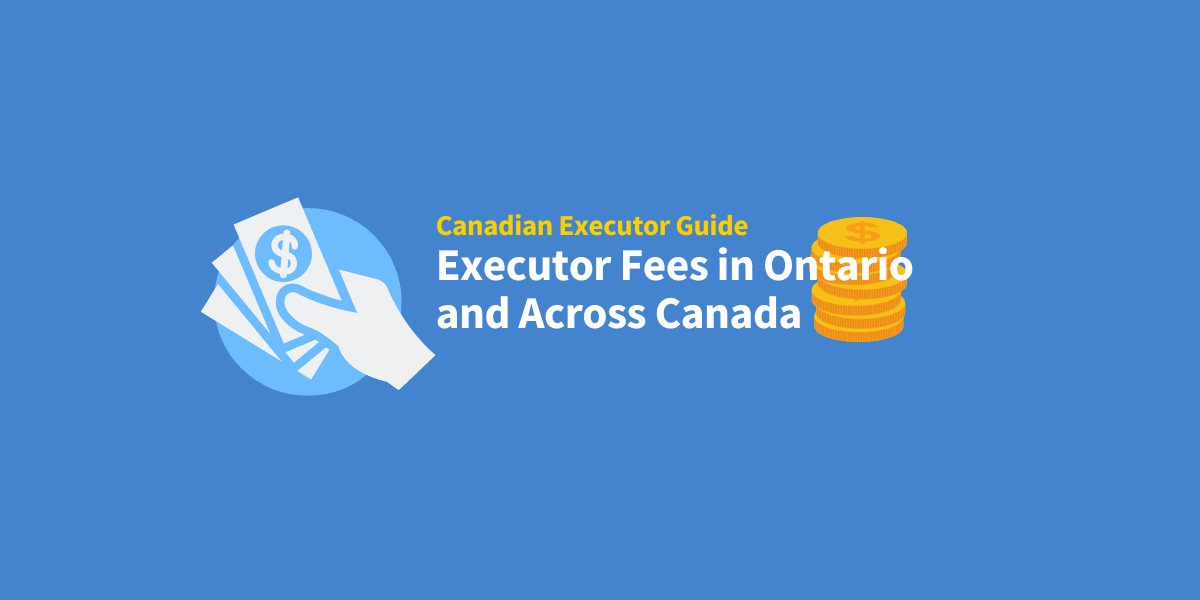
How much are Executor fees in Ontario? Canadian Executors are typically paid between 3% and 5% of the estate for their efforts. The final percentage amount changes depending on the province and specific estate circumstances, such as:
- Size of the estate
- Care and responsibility involved
- Time required to close the estate
- Skill and ability demonstrated
- How successful the estate closure was (were there any estate administration errors or litigation issues?)
The Will may also leave specific instructions about how much compensation the Executor is to receive. Although if the Will does not specify, then you should have a frank and open discussion with the beneficiaries and other executors of the estate about a fair percentage. (Do not avoid this conversation – legal disputes over executor fees do happen.)
Where does the 5% calculation come from? The Executor compensation is typically comprised of five factors:
- Capital receipts
- Capital disbursements
- Income receipts
- Income disbursements
- Per annum for ‘care and maintenance’
The best rule of thumb to remember is the more complex the estate, the higher the compensation fee. To be sure of your specific province or territory legislation, review the table below.
Executor Fees in Ontario and Across Canada
Not sure what the legislation for your province or territory says about executor compensation? There are small variations between what is standard coast to coast. (Be aware that your region may also refer to an Executor as a personal representative or trustee.)
| PROVINCE / TERRITORY | COMPENSATION FEE |
|---|---|
| Ontario | Up to 2.5% on both the amounts received and paid out of an estate, for a potential total of 5%. |
| British Columbia | 5% of the gross aggregate value of the estate under the Trustee Act, RSBC 1996, c. 464. |
| Alberta | 3% to 5% may be charged on the first $250,000. 2% to 4% may be charged on the next $250,000. 0.5% to 3% may be charged on the balance. The total compensation typically amounts to 5% of the entire value of the estate. |
| Saskatchewan | 2 – 5% of total estate assets. All else being equal, the larger the estate, the smaller the percentage fee, and the more effort and results, the greater the percentage. |
| Manitoba | The law does not state a fixed amount or a percentage of the estate that can be charged as fees by a personal representative. Queen’s Bench Form 74AA states that a personal representative of an estate is entitled to “fair and reasonable compensation for their care, pains and trouble”. Courts have stated that executor fees, if not specified in the will, should be reasonable under the circumstances. |
| Quebec | Bill by the hour (typically $45 – $65) or set a fee of 3 – 5% of the estate assets. |
| Nova Scotia | Not to exceed 5% of the value of the amount received. For example, a $400,000 estate would generate at most $20,000 in executor fees. |
| New Brunswick | 3% of estate gross value at the time of distribution. So, for example, a standard estate with gross assets of $750,000 would generate $22,500 in executor fees. |
| Prince Edward Island | Compensation is not to exceed 5% of the gross amount received (i.e., gross assets at death, plus any estate income). |
| Yukon Territories | Fees commonly range from 2-5% of estate assets. |
| Nunavut | The Nunavut Trustee Act specifies that executor compensation should be “fair and reasonable” for the services rendered, with the courts having final say. |
| Newfoundland | 5% of the realized/disbursed value of the assets and 0.4% of average estate value per year if not quickly distributable. |
How to Determine Executor Fees
Follow these steps to determine an appropriate and fair percentage for your Executor compensation:
- Review the Will; does it leave instructions for Executor compensation?
- If the Will does not mention Executor compensation, you need to discuss with the beneficiaries what they consider is a fair amount. Factors like the size and complexity of the estate should be considered.
- If there is more than one Executor, make sure you both (or all) understand that the compensation is shared amongst you. It is typically split evenly, but if one Executor did more work they could receive more.
- Multiply the value of the estate by 5% to get a rough estimate of the compensation. You can use this Executor Compensation Calculator.
- Make a final decision between the beneficiaries and Executors. Consider the time, effort, and special skills it took to close the estate.
Do You Have Executor Protection Yet?
Acting as an Executor? You are financially and legally responsible for the estate. That means if you make a mistake, if a creditor has issues, or if a beneficiary is unhappy, you could be sued. Protect yourself from the risks of your role, learn how to secure Executor Liability Insurance today.
More Questions about Your Executor Role?
Who should I choose to be my executor?
Can there be more than one executor of a will?
How can I protect my family and assets?
What is Executor Liability Insurance?
How can I prepare my child to be the executor of my estate?
Is there a preparation course for future executors?
How to Manage Cottage Co-Ownership
Is there a guide for executors?
What are my tasks as an executor?
Can I include my pet in my will?
